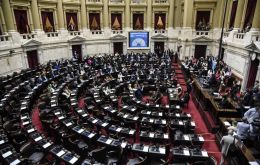MercoPress. South Atlantic News Agency
Tag: Javier Milei
-
Tuesday, January 28th 2025 - 07:41 UTC
Milei’s 2025 challenges: Between Argentina's mid-term elections and the IMF

By Alejandro Werner (*) - The author thanks Ignacio Albe, Olivier Blanchard, Martina Copelman, Joseph Gagnon, José de Gregorio, Patrick Honohan, Douglas Irwin, Maurice Obstfeld, and other PIIE colleagues for their comments and suggestions.
-
Thursday, January 23rd 2025 - 21:45 UTC
Milei targets progressiveness during Davos speech

Argentine President Javier Milei said Thursday during his appearance before the World Economic Forum (WEF) in Davos (Switzerland) that “we must eliminate the virus of woke ideology” that has been subverting the Western civilization's values over the past few years. Milei likened this “aberrant ideology” to a “virus” and insisted it was “the cancer that must be removed” if the “golden age” was to prevail.
-
Wednesday, January 22nd 2025 - 21:13 UTC
Milei would have no qualms breaking up with Mercosur if need be for FTA with US

Argentine President Javier Milei said in an interview with Bloomberg in Davos (Switzerland) that if breaking up with the Southern Common Market (Mercosur) was a requirement to sign a Free Trade Agreement (FTA) with the United States, he would not hesitate to do it.
-
Monday, January 20th 2025 - 07:12 UTC
Milei holds positive meeting with Georgieva

Argentine President Javier Milei and International Monetary Fund (IMF) Managing Director Kristalina Georgieva held a meeting Sunday in Washington DC ahead of Donald Trump's inauguration to discuss the economic situation in the South American country.
-
Saturday, January 18th 2025 - 10:15 UTC
Villarruel in charge of Argentina's Executive due to Milei's trip

Argentina Presidential Spokesman Manuel Adorni posted on X Friday that Vice President Victoria Villarruel was to be briefed shortly that she was to take over the Executive Branch given President Javier Milei's trip to Washington to attend Donald Trump's inauguration and to Davos for a World Economic Forum (WEF) convention, among other engagements.
-
Friday, January 17th 2025 - 08:57 UTC
Argentina to blend Montevideo diplomatic missions into one

Argentine President Javier Milei's “chainsaw” policies reached the South American country's diplomatic efforts: After recalling Ambassador Martín García Moritán from Uruguay citing “service reasons,” Buenos Aires announced it would be unifying its presence in Montevideo under one single Ambassador who would also be representing the country before the Latin American Integration Association (ALADI) and the Southern Common Market (Mercosur).
-
Thursday, January 16th 2025 - 10:14 UTC
Argentina recalls Ambassador in Montevideo due to “service reasons”

Ambassador Martín García Moritán has been removed from the Argentine mission in the Uruguayan capital and ordered back to Buenos Aires, according to Presidential Decree 29/2025 published Wednesday in the Official Gazette. The measure was adopted barely over a month before President-elect Yamandú Orsi's March 1 inauguration. The career diplomat had been appointed on Feb. 19, 2024.
-
Monday, January 13th 2025 - 06:44 UTC
IMF warns Milei about increasing poverty amid exchange rate controls

Despite approving Argentine President Javier Milei's management in a broad way, the International Monetary Fund suggested the South American country should pay more attention to exchange rate arrears and the increasing poverty.
-
Saturday, January 11th 2025 - 09:27 UTC
Milei calls for extraordinary parliamentary sessions

Argentine President Javier Milei Friday signed the decree summoning Congress to extraordinary sessions between Jan. 20 and Feb. 21 to debate the suppression of the Mandatory, Open, and Simultaneous Primary (PASO) elections, the clean record requirement for candidates, and other initiatives that, according to the Executive, cannot wait until the new Legislature starting on March 1.
-
Saturday, January 4th 2025 - 16:34 UTC
Milei welcomes González Urrutia at Casa Rosada

Venezuelan opposition leader Edmundo González Urrutia, whom many regard as the truthful winner of the July 28 elections in his country, was welcomed Saturday by Argentine President Javier Milei at the Casa Rosada. He made Buenos Aires the first stop of his tour ahead of what he has announced will be his inauguration on Jan. 10 in Caracas despite Nicolás Maduro's regime planning otherwise and offering a US$100,000 reward for his head.
